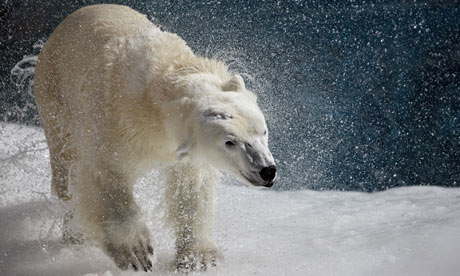Monbiot's shortlist of people who have done most for the denialist cause - in playing card form
With the Heartland Institute's annual jamboree for climate deniers in full swing in New York here's my shortlist of people who have done most for the denialist cause - in playing card form.
Four of clubs
Sammy Wilson
Northern Ireland environment minister
 Northern Ireland environment minister Sammy Wilson. Photograph: guardian.co.uk
Northern Ireland environment minister Sammy Wilson. Photograph: guardian.co.uk Sammy Wilson's appointment as Northern Ireland environment minister appears to have been conceived as some sort of practical joke. It's no longer very funny. He fills the same role as the former South African health minister, Manto Tshabalala-Msimang, who claimed that Aids could be treated with beetroot and lemon juice.
Wilson maintains that environmentalism is a "hysterical pseudo-religion". Climate change is natural and "beyond our control", so "resources should be used to adapt to the consequences of climate change rather than King Canute style vainly trying to stop it."
But the minister for hysterical pseudo-religion intends to cling onto his brief come hell or high water.
Six of diamonds
Václav Klaus
President of Czech Republic
 President of the Czech Republic, Václav Klaus, one of the Top 10 climate change deniers. Photograph: guardian.co.uk
President of the Czech Republic, Václav Klaus, one of the Top 10 climate change deniers. Photograph: guardian.co.uk
Klaus is the rightwing president of the Czech Republic, criticised by
Vaclav Havel as a promoter of "gangster capitalism". He describes
himself as "the most important 'denier' in the world", though Viscount
Monckton (see below) might take issue with this.
He told the US Congress that "manmade climate change has become one of the most dangerous arguments aimed at distorting human efforts and public policies in the whole world … Communism was replaced by the threat of ambitious environmentalism." Climate change, he says, is caused "not by human behaviour but by various exogenous and endogenous natural processes (such as fluctuating solar activity)".
He describes concern about climate change as a "new wave of dangerous indoctrination of the whole world" and says that "global-warming alarmism is challenging our freedom, and Al Gore is a leader of that movement."
Seven of hearts
Steve Milloy
Fox News columnist
 Fox News columnist Steve Milloy. Photograph: guardian.co.uk
Fox News columnist Steve Milloy. Photograph: guardian.co.uk Steve Milloy writes a weekly "Junk Science" column for Fox News, which he uses, among other topics, to pour scorn on studies documenting the medical effects of secondhand tobacco smoke and showing that climate change is taking place. Fox describes his credentials thus: "Steven Milloy publishes JunkScience.com and manages the Free Enterprise Action Fund. He is a junk science expert, and an adjunct scholar at the Competitive Enterprise Institute".
What it doesn't say is that he has long acted as a paid advocate for the tobacco company Philip Morris, while the fake grassroots group he runs has also received funding from ExxonMobil.
His website has been the main entrepôt for almost every kind of climate change denial that has found its way into the mainstream press. Milloy claims to be campaigning against "faulty scientific data and analysis used to advance special and, often, hidden agendas", which seems to be a pretty good summary of his own activities.
Eight of spades
Prof Pat Michaels
Cato Institute
 Prof Pat Michaels from the Cato Institute. Photograph: guardian.co.uk
Prof Pat Michaels from the Cato Institute. Photograph: guardian.co.uk Michaels played a starring role in Channel 4's The Great Global Warming Swindle and is regularly used by the US media, largely because he is one of the very few deniers who has any relevant scientific credentials.
He maintains that: "When it comes to global warming, apparently the truth is inconvenient. And it's not just Gore's movie that's fiction. It's the rhetoric of the Congress and the chief executive, too."
Something he is less keen to reveal is that, as a leaked memo from an electricity company shows, he has recently been paid at least $100,000 by companies involved in coal-fired power production to make the public case against climate change. In 2007 Michaels withdrew as an expert witness from a court case about climate change, after it became clear that his other sources of funding could be revealed to the public.
Nine of diamonds
Christopher Monckton
Former adviser to Margaret Thatcher
 Former adviser to Thatcher Christopher Monckton. Photograph: The Guardian
Former adviser to Thatcher Christopher Monckton. Photograph: The Guardian Viscount Monckton of Brenchley, whose academic qualification is a classics degree, maintains that "politicians, scientists and bureaucrats contrived a threat of Biblical floods, droughts, plagues, and extinctions worthier of St John the Divine than of science." He came to public notice with a long paper published on the website of the Sunday Telegraph, accusing the UN of scientific fraud. His paper was filled with sciencey equations and calculations, which were rapidly dismissed as bunkum by real scientists.
He has threatened several of those who have challenged his scientific claims with libel suits, but they have not yet materialised. Though he has never held a seat in the Lords, he maintained in a threatening letter to two US senators that he was "a member of the Upper House of the United Kingdom legislature".
He has also claimed that, among other unlikely feats, he was responsible for winning the Falklands war. His grand statements about climate science and his own credentials have earned him the nickname among some environmentalists of Viscount Monckhausen.
10 of hearts
Sarah Palin
Governor of Alaska
 Governor of Alaska Sarah Palin. Photograph: guardian.co.uk
Governor of Alaska Sarah Palin. Photograph: guardian.co.uk An Alaskan denying climate change is like a Saudi Arabian denying sand. But can she do it? You betcha. The eagle-eyed governor can – or so the satirists claim- see Russia from her house, but apparently not the melting permafrost, shrinking glaciers and disappearing sea ice closer to home.
During her vice-presidential campaign, she embarrassed John McCain by maintaining: "I'm not one though who would attribute it [climate change] to being manmade." She has refused to classify the polar bear as an endangered species on the grounds that the sea ice is here to stay, but is making plans for opening up the Arctic Sea to oil drilling, on the grounds that the ice is due to disappear. Could her ambivalence towards climate change have anything to do with the fact that Alaska is a major oil state? You betcha.
Jack of clubs
James Inhofe
Senator for Oklahoma
 US Senator for Oklahoma James Inhofe one of the Top 10 climate change deniers. Photograph: AP/The Guardian
US Senator for Oklahoma James Inhofe one of the Top 10 climate change deniers. Photograph: AP/The Guardian Inhofe is the senior Senator for Oklahoma. He leads the Republican party's Neanderthal tendency and receives more campaign money from fossil fuel companies than from any other sector.
In 2003 he delivered a speech to the Senate called The Science of Climate Change, in which he said: "The claim that global warming is caused by manmade emissions is simply untrue and not based on sound science … With all of the hysteria, all of the fear, all of the phony science, could it be that manmade global warming is the greatest hoax ever perpetrated on the American people? It sure sounds like it."
Seeking to characterise environmentalists, he says: "I could use the Third Reich, the Big Lie ... You say something over and over and over and over again, and people will believe it, and that's their strategy." He has also compared the US Environmental Protection Agency to the Gestapo. Terrifyingly, until 2006 Inhofe chaired the Senate Committee on Environment and Public Works.
Queen of diamonds
Melanie Phillips
Daily Mail columnist
 Daily Mail columnist Melanie Phillips. Photograph: The Guardian
Daily Mail columnist Melanie Phillips. Photograph: The Guardian Mel P (Genuinely Scary Spice) appears to believe that half the scientists on earth are engaged in a series of giant conspiracies. Like Christopher Booker (below), she dismisses not only climate change but also the entire canon of evolutionary science. She also stoutly defends the thesis that MMR injections cause autism.
She claims that "the theory that global warming is all the fault of mankind is a massive scam based on flawed computer modelling, bad science and an anti-western ideology … The majority of well-meaning opinion in the Western world believes a pack of lies and propaganda". She has also maintained that "carbon dioxide forms a relatively small proportion of the atmosphere, most of which consists of water vapour."
If this were the case, we would need gills.
King of diamonds
Christopher Booker
Sunday Telegraph columnist
 Sunday Telegraph columnist Christopher Booker. Photograph: Rex/The Guardian
Sunday Telegraph columnist Christopher Booker. Photograph: Rex/The Guardian Booker writes a column in the Sunday Telegraph. It's filled with so many misleading claims about climate change, evolution, asbestos, speed cameras and the European Union that it would take an encyclopedia to document them.
His most famous contention was made in a column in February 2008. The previous September, he noted, "sea ice cover had shrunk to the lowest level ever recorded. But for some reason the warmists are less keen on the latest satellite findings, reported by the US National Oceanic and Atmospheric Administration. … Its graph of northern hemisphere sea ice area, which shows the ice shrinking from 13,000m sq km to just 4m from the start of 2007 to October, also shows it now almost back to 13m sq km."
To reinforce this point, he helpfully republished the graph, showing that the ice had indeed expanded between September and January. The Sunday Telegraph continues to employ a man who cannot tell the difference between summer and winter. The prestigious and highly sought Christopher Booker prize for climate change denial was named in his honour.
Ace of spades
David Bellamy
TV presenter
 TV presenter David Bellamy. Photograph: The Guardian
TV presenter David Bellamy. Photograph: The Guardian Because he was once an environmentalist and a famous broadcaster, David Bellamy is used as the mascot of climate change deniers all over the world. Like most mascots he is cute, furry and apparently incapable of rational thought. He has claimed that global warming is "poppycock", that "the global warmers are telling lies – carbon dioxide is not the driver" and that "555 of all the 625 glaciers under observation by the World Glacier Monitoring Service in Zurich, Switzerland, have been growing since 1980" (the WGMS responded that this was "complete bullshit").
He maintains that "since I said I didn't believe human beings caused global warming I've not been allowed to make a TV programme." This is odd because he stopped making TV programmes in 1994. He was making public statements in support of mainstream climate science until at least 2000, and his first public statement to the contrary was in 2004. But the conspiracy extends even further. "Have you noticed there is a wind turbine on Teletubbies?", he asked in the Daily Express. "That's subliminal advertising, isn't it?"








